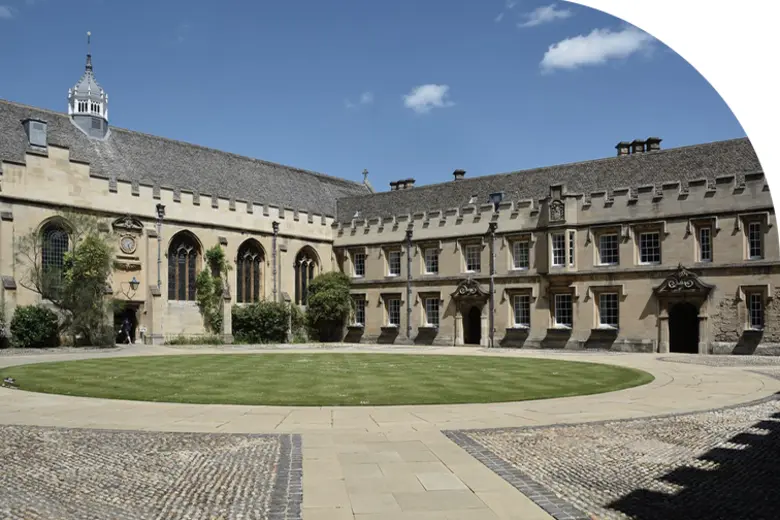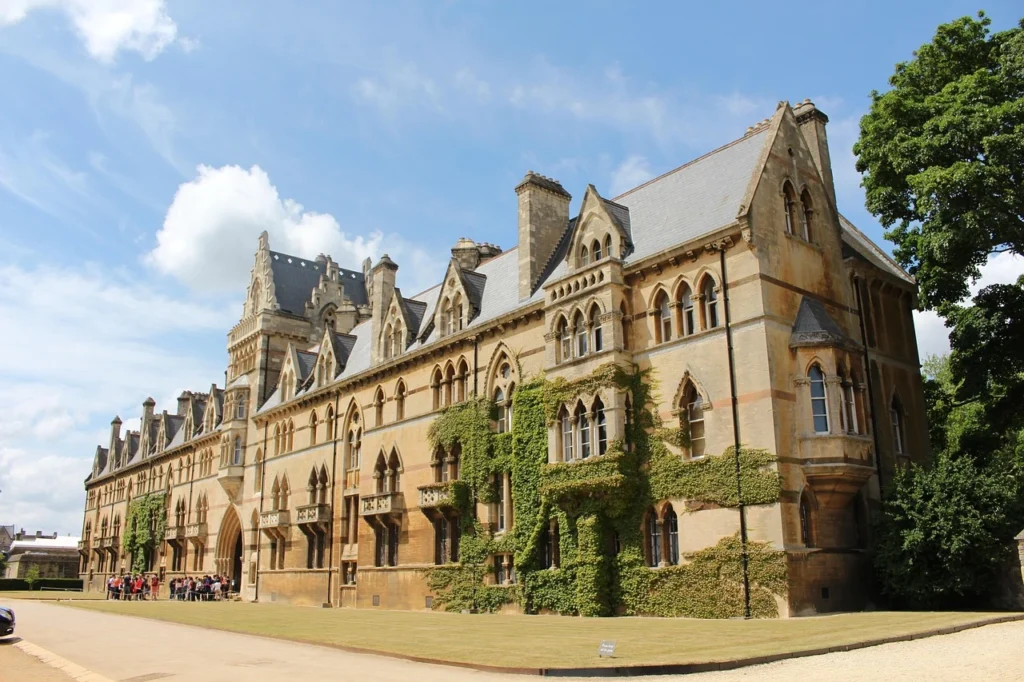Biology at Oxford University

Overview of Course
Subject Requirements
Required subjects: Biology and either Chemistry, Physics or Maths
Recommended subjects: Not applicable
Helpful subjects: Not applicable
Requirements of Other Courses
Admissions tests: None
Written Work: None
Admissions Requirements
46%
Interviewed
15%
Successful
109
Intake
About the Course
Biology is the science of life — a dynamic and fast-evolving subject. In recent years, major advances in technology and the blending of different biological fields have driven significant breakthroughs. These developments are helping tackle some of the world’s biggest challenges, including disease, poverty, biodiversity loss, and climate change.
Oxford’s updated Biology at Oxford University course, introduced in 2019, reflects these changes. It promotes a cross-disciplinary approach, beginning in the first year with a solid grounding in core biological concepts. In the second and third years, students can tailor their studies by selecting from a broad range of specialist topics, allowing for deeper exploration. Current options include:
- Animal behaviour and physiology
- Cell biology
- Conservation
- Developmental biology
- Disease biology and host-microbe interactions
- Ecology
- Evolutionary biology
- Genomics
- Plant physiology and molecular biology
Students have the option to complete a fourth year. After three years, they can graduate with a BA, or they may continue into the fourth year to carry out an in-depth research project under expert supervision. Admission to the final year depends on academic performance in years two and three.
Teaching is led by Oxford’s Department of Biology, with most sessions held in the University’s Science Area. Students also benefit from access to top-class facilities, including the Oxford University Museum of Natural History, Botanic Garden, Herbarium, Arboretum, John Krebs Field Station, and Wytham Woods.
Fieldwork is an important part of the course. All students take part in a compulsory UK residential ecology course in the first year, with additional optional field trips available in the second year.
A strong emphasis is placed on research skills throughout all years. In the first year, students receive training in practical skills, including carefully planned dissections designed with animal welfare and conservation in mind.
In the second year, skills training becomes more advanced and includes essential practical and data analysis techniques. Students also choose from a set of one- or two-week extended skills courses, such as avian behaviour, digital morphology, genome editing, ecological fieldwork, and plant molecular biology.
In the third year, students focus on more specialised topics. Skills training continues through activities like journal clubs and computer-based classes.

Course Structures
Year 1
Courses:
- Three compulsory themes:
- Diversity of Life
- Building a Phenotype
- Ecology and Evolution
- Mandatory research skills training, including a group mini-project in the first term
- A residential field course during the summer term
Assessment:
- Three written exams (covering lectures and research skills)
- Assessed practical work and write-ups
Year 2
Courses:
- Students choose at least three out of the following four themes:
- Genomics and Host-Microbe Interactions
- Cell and Developmental Biology
- Organisms – Behaviour and Physiology
- Ecology and Evolution
- Compulsory skills training, including extended two-week courses. Topics may include:
- Microbiome research
- Gene transfer
- Ornithology
- Tropical ecology
Assessment:
- Two written exam papers
Coursework
Year 3
Courses:
- Choice of eight advanced options based on the themes introduced in Year 2
- Students must select at least four of the eight options
- Ongoing skills training through computing classes and participation in journal clubs
- (A full list of current options is available on the Biology course website.)
Assessment:
- Three written exams
Coursework
Year 4 (Optional – MBiol)
Courses:
- Students undertake a major research project under academic supervision
- Participation in a student mini-conference to present research findings
Assessment:
- Dissertation
Students may choose to finish the course after three years and graduate with a BA. Those who meet the academic performance criteria in Years 2 and 3 can progress to the fourth year and graduate with an MBiol.
Note: Course content and structure are subject to change. For the latest updates, refer to the official course page.

Academic Requirements
| Qualification | Requirements |
|---|---|
| A-levels | AAA — including Biology and either Chemistry, Physics or Mathematics. The A must be in a science or Mathematics. |
| Advanced Highers | AA or AAB |
| International Baccalaureate (IB) | Total score of 39 points (including core points). Must include Biology and either Chemistry, Physics, or Mathematics, with a score of 7 at Higher Level in one of the sciences or Mathematics. |
| Other Qualifications | See guidance on accepted UK and international qualifications. |
Subject Requirements
- Essential: Biology, plus one of the following: Chemistry, Physics, or Mathematics (at A-level, Advanced Higher, IB Higher Level, or equivalent).
- If your science A-levels include a practical component, you are expected to pass it.
- If English is not your first language, you may need to meet Oxford’s English language requirements.
Application
All candidates must follow the application steps outlined on Oxford’s official Applying to Oxford pages.
Course-Specific Application Information
- All applicants must apply for the MBiol course.
After three years, students can choose to graduate with a BA or continue into the fourth year to complete the MBiol.
Progression to the fourth year depends on strong academic performance in the first three years.
Written Work and Admissions Tests
- No written test or submitted written work is required when applying for this course.
What Tutors Are Looking For
Tutors look for candidates who show:
- A strong enthusiasm for biology
- Independent thinking
- Analytical reasoning skills
To make your application competitive, it’s crucial that your UCAS personal statement clearly reflects a genuine passion for Biology.
Applicants who do not convey this in their statement are unlikely to be shortlisted for intervie Note: This course does not focus on human biology or medicine. If your main interest lies in those areas, consider applying for one of the following Oxford courses instead:
- Biochemistry (Molecular and Cellular)
- Biomedical Sciences
- Human Sciences
- Medicine
Interview Process
- Interviews are not primarily about testing factual knowledge.
Instead, tutors want to see how you think, how you approach problems, and how you express curiosity about biology. - Be ready to discuss:
- Aspects of biology you find particularly fascinating
- Topics beyond your current knowledge or curriculum
- Tutors are more interested in your thinking process than in whether your answers are correct.
During the interview, you may be asked to:
- Interpret a biological diagram or image
- Analyse a graph or dataset
- Read and respond to a short written passage
The interview process is challenging but supportive, aimed at identifying your potential rather than testing memorized facts.
Careers
About 40% of Biology at Oxford University graduates choose to continue their studies, pursuing research doctorates (PhDs) or postgraduate qualifications in applied fields.
The majority of the remaining graduates move directly into professional careers across a wide range of sectors, including:
- Education
- Scientific research
- Non-profit and charitable organisations
- Healthcare
- Environmental conservation
- Media and science communication
- Marketing and public relations
- Consultancy and policy
Graduate Stories
Hannah – now a Research Assistant at the Royal Veterinary College – shares:
“My degree sparked a deep interest in Biology at Oxford University and gave me the tools to explore it. So far, I’ve tracked rhinos across deserts, chased birds across oceans, and now I’m working with chickens!”
Jenny, after working in medical communications, now runs her own business supporting global pharmaceutical companies. She says:
“The tutorial system and writing experience at Oxford helped me build vital skills — analysing data, interpreting results, and clearly presenting complex information, such as clinical trial findings.”
The current Biology course was first introduced in 2019, so comprehensive graduate outcomes are still being collected.
The career insights provided here are based on reliable data from the previous 3-year BA in Biological Sciences, supported by early outcomes from the first MBiol cohorts.
Fees
| Fee Status | Annual Fees |
|---|---|
| Home | £ 9,535.00 |
| Overseas | £ 59,260.00 |
Living Expenses
Living in Oxford may be more affordable than you think. The University’s extensive resources and college support can help reduce overall expenses.
For students starting in 2025, estimated living costs range from £1,425 to £2,035 per month while in Oxford.
Oxford’s academic year is divided into three eight-week terms, meaning students typically spend just over six months in Oxford annually. However, it’s advisable to budget over a nine-month period to ensure you can cover essential expenses during the holidays as well.
For full details, visit Oxford’s Living Costs webpage.
Financial Support
Home Students (UK, Irish nationals, and eligible others)
- Tuition Fee Loan:
Home students undertaking their first undergraduate degree can apply for a tuition fee loan from the UK government. This covers the full cost of course fees, meaning you don’t need to pay anything upfront. - Oxford Bursaries (2025 entry):
Oxford offers one of the most generous bursary packages in the UK:- Students with a household income of around £50,000 or less are eligible for support.
- Additional funding is available for students from households earning £32,500 or less.
- Living Costs Support:
UK students and others with settled status who meet the residence requirements may also qualify for living cost support from the government.
*From 1 August 2021, EU, EEA, and Swiss nationals are eligible for UK student finance only if they have UK citizens’ rights (e.g. pre-settled or settled status, or are Irish citizens under the Common Travel Area agreement).
The level of support available depends on your residency status. See further details here.
Islands Students
(Students from the Channel Islands and Isle of Man)
Islands students receive different financial support than students from mainland UK.
Please check the relevant local funding agency websites:
- States of Jersey
- States of Guernsey
- Isle of Man
Overseas Students
Overseas students are not eligible for UK government loans or bursaries, but may apply for funding through Oxford’s scholarships.
Visit the “Other Scholarships” section on the Oxford Bursaries and Scholarships page for options.
Note: If you have already completed an undergraduate degree, you may be classed as an ELQ (Equivalent or Lower Qualification) student and may not be eligible for Oxford or UK government financial support.
Additional Fees and other Charges for Biology
While the University aims to subsidise course-related costs as much as possible, some fieldwork and project activities may require student contributions.
Year 1 – Compulsory Field Course (Fully Funded)
- In the summer term, all first-year students must take part in a UK-based residential field course (typically 6 days).
- Students will study living organisms in a range of terrestrial and marine environments.
- This field course is assessed as part of the first-year exams.
- All costs — including food, accommodation, and travel — are covered by the University, so no student payment is required.
Year 2 – Optional Field Skills Courses (Student-Funded)
At the end of the second year, students choose from a range of optional extended skills courses, some of which include field trips.
For 2025, the following trips and estimated costs are planned:
Trip Location | Focus | Estimated Cost |
Oxford and Dorset | Conservation programmes tackling biodiversity loss | £440 |
Northern Ireland and Wytham Woods | Field ecology of birds | £475* |
Borneo | Tropical rainforest ecology (plants and animals) | £1,900 |
*Students will also cover the cost of lunches and evening meals during the Northern Ireland/Wytham trip.
Year 4 – Research Project (Partial Funding)
- If you continue to the fourth year (MBiol), you’ll complete a research project as a core part of the course.
- The Department of Biology provides funding to cover reasonable research expenses.
- However, some projects — especially those involving specialised equipment, travel, or supplementary research — may require additional funding from the student.
In rare cases, students may be asked to contribute towards extra costs for research, depending on their chosen topic.
Life at College
Oxford’s colleges are central to what makes the University one of the best in the world. Every student belongs to:
- A college
- Their subject department(s)
- The University
This unique system gives students the best of both worlds: the resources of a world-class institution and the support of a close-knit academic community.
Offers from the College
Each college has its own distinctive character, but all provide the essential facilities you’ll need:
- Porters’ lodge (staffed entrance and reception)
- Dining hall
- Lending library (often open 24/7 during term time)
- Student accommodation
- Tutors’ teaching rooms
- Chapel and/or music rooms
- Laundry facilities
- Green spaces
- Common room (JCR – Junior Common Room)
Accommodation
- All first-year students are guaranteed college accommodation, either on-site or in a nearby college annexe.
This means your neighbours will also be new to Oxford — helping you settle in and make friends easily. - Most colleges offer at least one additional year of college accommodation, and some offer housing for the entire degree.
You can either stay in college for all your time at Oxford or choose to live elsewhere (for example, with friends from other colleges) after your first year.
Community Support
- College tutors support your academic progress and can also offer advice on other areas of student life.
- Dedicated staff, including welfare officers, are available to help with practical issues or personal concerns.
- Many students are also supported by peers — through college families or as trained peer supporters via the University’s Counselling Service.
Oxford’s college system ensures you’re never just another face in the crowd — you’re part of a supportive academic and social community.
Explore Outreach Opportunities
- Check out Oxford’s Outreach Event Calendar for upcoming University-wide, college-specific, and subject-focused
- You’ll find supercurricular resources for all age groups on the:
- Digital Resource Hub
- Suggested Subject Resources
- Oxplore — our interactive learning platform for 11–18-year-olds
Discover the UNIQ Programme
UK state school students in their first year of further education can apply to UNIQ — Oxford’s flagship outreach programme.
- Offers academic residentials across 30+ subjects
- Welcomes around 1,500 students each year
- Gives participants a taste of Oxford teaching, student life, and expert application support
- Free of charge
Application Support
Prospective applicants can sign up for step-by-step guidance through every stage of the Oxford application process.
Learn more about how Oxford is widening access and supporting students before they apply:
👉 Widening Access at Oxford
Oxford Biology Programs FAQ
Oxford offers a variety of biology-related courses including Biology (MBiol), Biochemistry, and Biological Sciences, covering molecular, cellular, organismal, and ecological levels of biology.
Entry requirements typically include A*AA at A-level with strong emphasis on Biology and at least one science or Maths subject. International qualifications like IB require a total of 39 points including Biology with high scores in sciences.
Yes, Oxford biology students have access to world-class research facilities, including hands-on lab work, tutorials, and collaborations with leading scientists and institutes.
While traditional biology courses do not usually include compulsory study abroad, some programs offer research placements or collaborations internationally. Students should check specific course details for options.
Tutorials are small-group or one-on-one sessions led by expert tutors, focusing on your work and understanding, allowing personalized feedback and deep discussion beyond lectures.
